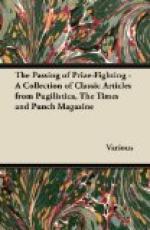The gloom of the daily Irish catechism was a little brightened by an interchange of pleasantries between Mr. STANTON and Mr. JACK JONES. On this occasion the latter had rather the best of it. “Golliwog!” he shouted in allusion to his opponent’s luxuriant chevelure. Mr. STANTON could think of no better retort than the stereotyped “Bolshie!” and when Mr. JONES rejoined with “You ought to be put into Madame Tussaud’s” Mr. STANTON was reduced to silence. But is it not a scandal that these entertaining comedians should only get four hundred a year?
On the Agriculture Bill Sir A. GRIFFITH-BOSCAWEN was faced with an urgent demand for a separate Wages Board for Wales. First he wouldn’t; it would be “an exceedingly inconvenient and expensive arrangement.” But the Welshmen were so insistent that he changed his mind, and when the vigilant Sir FREDERICK BANBURY challenged the new clause on the ground that it would impose a fresh charge on the Exchequer Sir ARTHUR was able to convince the SPEAKER that, though there would be “additional expenditure,” there would be no “fresh charge.” Such are the nice distinctions of our Parliamentary system.
Wednesday, November 3rd.—When Mr. CHURCHILL, some sixteen years ago, crossed the floor of the House, his man[oe]uvre was regarded as a portent, and men talked of “a sinking ship.” It cannot be said that Lord HENRY BENTINCK’S sudden appearance among the Labour Members created anything like the same sensation, even though he was joined a little later by Mr. OSWALD MOSLEY. Lord HENRY has always derived his political opinions rather from his heart than his head, and has lately developed a habit of firing explosive Questions at Ministers from his eyrie behind their backs. They will probably find his frontal attacks less disconcerting.
[Illustration: “OLD GOLLIWOG.”
Mr. C. B. STANTON (As viewed by Mr. JACK JONES).]
While Lord HENRY was in the House, off and on, for thirty-four years before discovering that he was on the wrong side, Mr. MOSLEY has made the same discovery after an experience of barely as many weeks. From his new perch he inquired this afternoon if Government cement was being sent abroad, to the detriment of British builders. Dr. ADDISON contented himself with professing ignorance of any such transaction. A less serious Minister might have replied that the Government needed all their cement to mend the cracks in the Coalition.
News that the coal-strike was over reached the House during the evening. Mr. BRIDGEMAN, always cautious, “understood” that the men had been “recommended” to go back to work. Mr. ADAMSON, fresh from the Conference, was much more downright. “The strike,” he said, “has been declared off, and the men return to work.” So that’s that.




